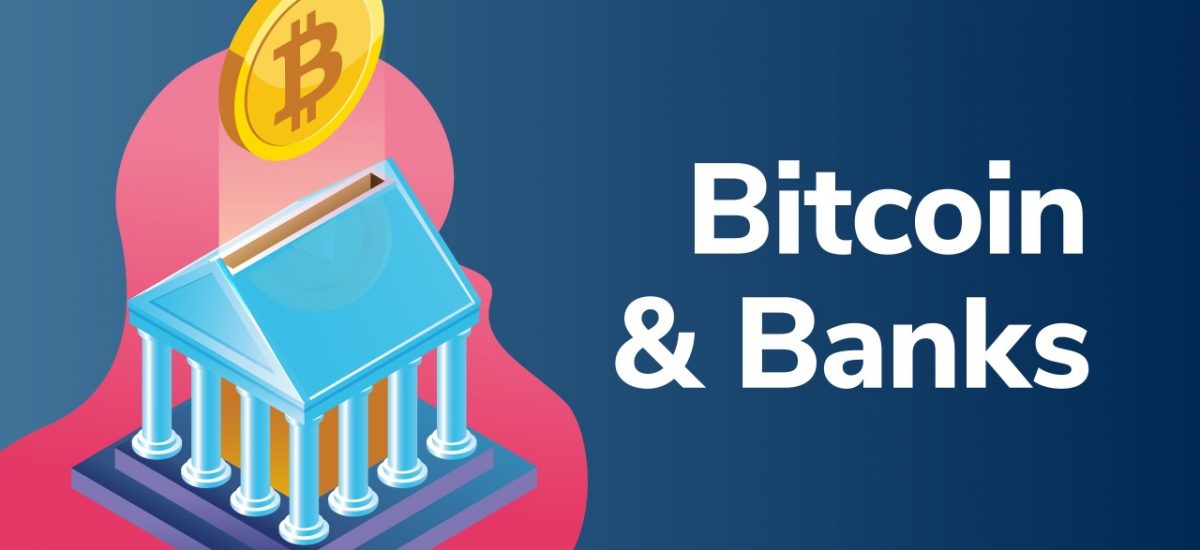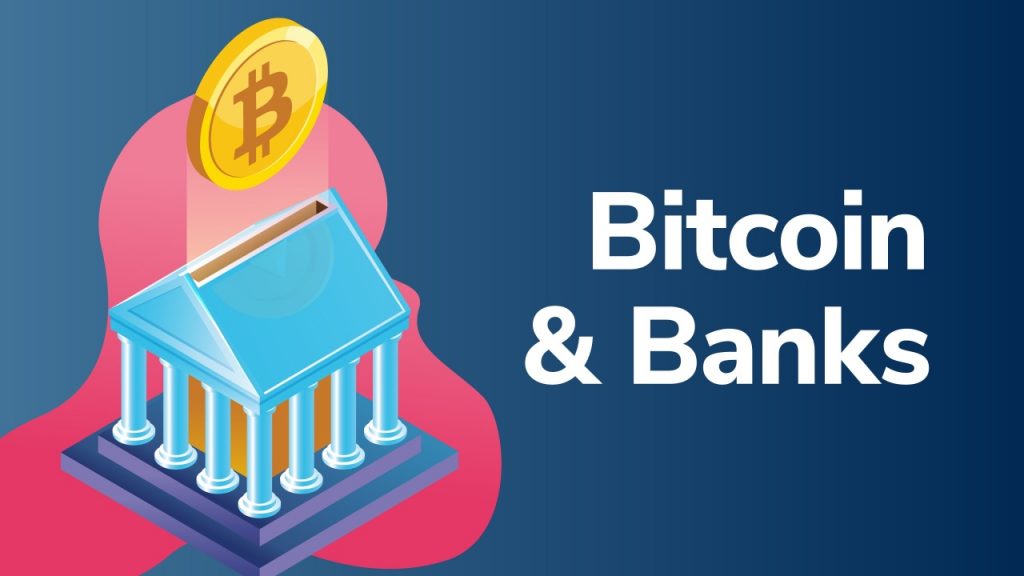
It can seem like only yesterday banks and traditional financial institutions were tripping over themselves trying to bring down crypto. For several years, Bitcoin has repeatedly been declared a scam, a Ponzi, and a bubble. Yet, here we are in the year 2021. Bitcoin and banks are becoming increasingly intertwined as the legacy system finally looks to be embracing blockchain technology. As a result, we’re beginning to see a rise in crypto-friendly banks globally.
Despite Bitcoin historically posing a threat to banks, it appears that banks are looking for new avenues to stay relevant. Facing economic turmoil, many central banks are experimenting with central bank digital currencies (CBDCs). China, Canada, and parts of Europe have already accelerated this transition. Now, even global finance laggards are starting to take notice. The rise of crypto-friendly banks hints towards potentially improved regulation within the industry. Furthermore, it shows great promise for the future adoption of cryptocurrency and blockchain.
In this article, we’ll explain the evolving relationship between Bitcoin and banks, and why the integration of blockchain is critical to the future of the legacy financial infrastructure. Also, we’ll take a look at some of the crypto-friendly banks that have recently emerged. Furthermore, we’ll explore how the future of finance is being shaped by blockchain technology.
When looking at the future of money and finance, it’s crucial to have an understanding of where it came from and how it has changed over time. If you’d like to learn about the history of money and how cryptocurrency is changing how we view currency, The Bitcoin Standard Course at Ivan on Tech Academy is designed to guide you through every step of your journey!
Bitcoin Basics
You may be asking yourself, “What exactly is Bitcoin and why does it pose such a threat to financial institutions?” In short, Bitcoin is sound, digital money used as a store of wealth. Every Bitcoin transaction is immutably recorded on the Bitcoin blockchain and all transactions are made public for anyone to see.

Ultimately, Bitcoin exists as pieces of code and not physical money. Moreover, there is a hard cap of 21 million coins that can ever be mined (created). Bitcoin is mined, validated, and transacted through a globally distributed network of computers called nodes. The network is decentralized and therefore Bitcoin cannot be adjusted, manipulated, or inflated by any centralized party. Additionally, this means there is no single point of failure.
Bitcoin was launched in 2009 by the anonymous developer(s) Satoshi Nakamoto. Since then, the Bitcoin network has continued to grow as the largest cryptocurrency by market cap. Cryptocurrencies use blockchain technology – which includes a combination of cryptography, maths, and computer science, to verify transactions. Furthermore, transactions are only validated once the entire Bitcoin network of nodes reaches a consensus. This prevents double-spending and means that nobody can falsify a transaction.
The Evolution Of Currencies
The internet changed the way most industries operate (think Amazon, Airbnb, Uber). However, the digital revolution within the financial industry is only just beginning. There are now various forms of currency, each with its own defining characteristics. It’s important to understand the main function of each type of currency to gain an understanding of the evolution of money. We can break down the different kinds of currencies as follows:
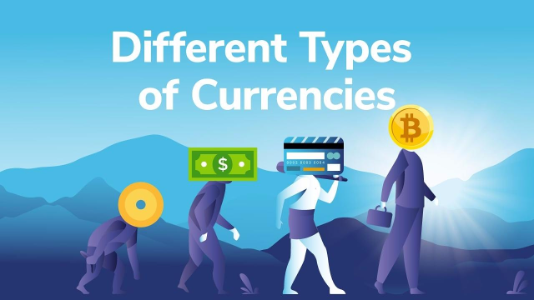
Precious Metals: Gold and silver have been used as a unit of account and a medium of exchange for centuries. Once upon a time, banks would even use gold to back currencies.
Fiat Currency: Paper currency distributed by the government. Not backed by gold, printed out of thin air.
Digital Currency: The numbers you see in your bank account, credit accounts, PayPal account, etc.
Virtual Currency: The currency you earn and spend within a gaming ecosystem.
Cryptocurrency: Blockchain-based cryptographically-verified coins or tokens. Cryptocurrencies can be further subcategorized into utility tokens, governance tokens, stablecoins, and beyond.
Central Bank Digital Currency (CBDCs): A form of digital currency soon to be implemented around the globe. CBDCs will be like regular digital currencies, however, they will be directly distributed from a Central Bank.
The number of different currencies available can seem intimidating at first. Make sure to see our Different Types of Currencies article for further details! As we see the advent of crypto-friendly banks, these institutions will need to adapt to an increase in innovation around different forms of currencies.
Bitcoin And Banks 2021
In September 2020, the centralized crypto exchange Kraken became the first crypto bank, following an approved application for a special purpose depository institution (SPDI) charter. This marked the beginning of a new banking model.
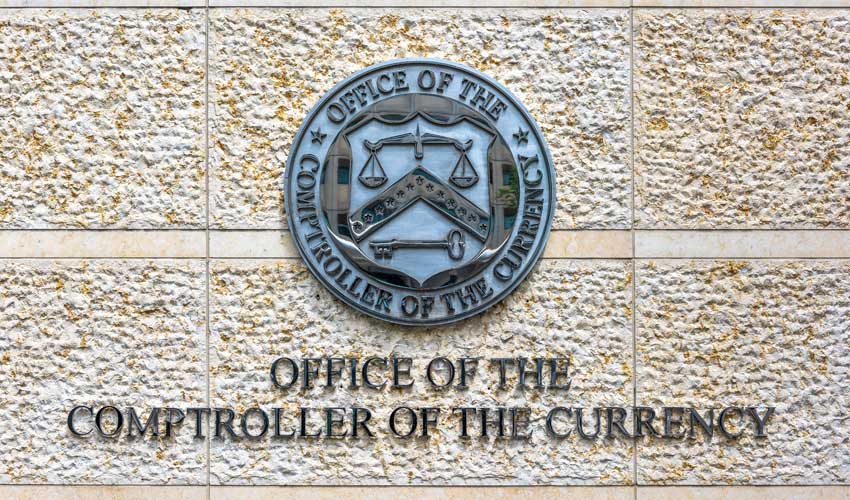
Then, on January 4th, 2021, history was made. The OCC (Office of the Comptroller of the Currency) published a letter to US banks. The letter announced plans for future interoperability of banks and blockchain. As of this date, banks have the authority to make use of public blockchains and stablecoins for transactions and settlements. Also, banks can now participate in the running of their own network of nodes, known as the independent node verification networks (INVN).
According to the OCC, implementing stablecoin settlements and activity with the INVN may “enhance the efficiency, effectiveness, and stability of payments activities and achieve the benefits of real-time payments already enjoyed in other countries”.
The following week, it was announced that crypto firm Anchorage received approval from the OCC to obtain a federal license to operate as a crypto bank. Anchorage requested a national banking charter in 2020. Since then, Anchorage has been busy implementing structural procedures to comply with OCC risk management, the National Bank Act, and liquidity requirements. This new regulation will enable banks and financial institutions to provide custodial services for crypto assets such as Bitcoin. Anchorage is paving the way for other businesses evolving the intertwinings of the traditional and blockchain-based banking sectors.
Green Light For Crypto
Another bullish sign for crypto-friendly banks is the memorandum signed between the Ministry of Finance and Digital Transformation of Ukraine, and the Stellar Development Foundation. Published on the Ukraine government website, the development partnership will implement Stellar as the foundational technology for creating Ukraine’s central bank digital currency (CBDC), digital asset marketplace, and regulatory framework. The memorandum aims to “strengthen Ukraine’s status as an innovative digital country in the financial field of Eastern Europe”. The development between teams will commence in August 2021.
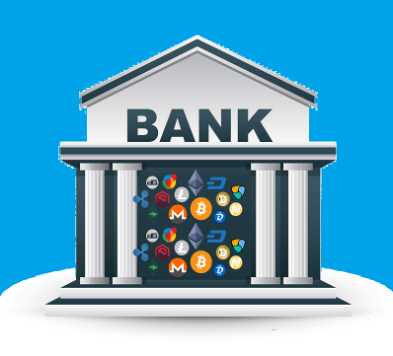
Also, Fintech firm Cashaa has teamed up with financial service provider United Multistate Credit Cooperative Society to launch the world’s first physical cryptocurrency banking branch Unicas, based in Jaipur, India. The move will facilitate the buying and selling of crypto assets alongside regular banking services. Also, customers will be able to use their crypto assets as collateral to take out loans. Unicas ultimately aims to expand to 100 physical branches by 2022.
Many global Fintech companies have already integrated blockchain into their existing systems. Find out how blockchain is being used on an enterprise-scale with our Blockchain For Enterprise and Fintech 101 courses. Blockchain is the most in-demand skill right now. Eventually, almost every company will consider the use of blockchain as innovations in technology and finance continue to thrive!
Introducing Crypto-Friendly Banks
We’ve come a long way in 13 years. It’s fair to say that Bitcoin and banks have had a rocky relationship. However, in recent months, some of the largest banks on the planet have issued a request for information (RFI) to look into digital asset custody.
The coming together of Bitcoin and banks was spearheaded by JPMorgan after the firm issued its RFI in October 2020 regarding crypto custody services. Moreover, JPMorgan was the first US bank in history to create its own cryptocurrency announced in February 2019. The JPMorgan coin (JMP), which was launched in October the following year. According to The Block, JPMorgan is enlisting ‘sub-custodians’ to offer custodial services of digital assets. Also, the banking giant has reached out to crypto firms Paxos and Fidelity Digital Assets to aid in implementing these services. It was just over 3 years ago that JPMorgan CEO Jamie Dimon publicly claimed “Bitcoin is a fraud that will blow up”. Now, JPMorgan is helping shape the future structural relationships between Bitcoin and banks.
Banking giant Goldman Sachs is another name on the list of crypto-friendly banks. An anonymous source from within the bank exposed the issuance of a request for information (RFI) into digital asset custody, according to an interview with Yahoo Finance. This was part of a wider “digital asset strategy” following the green light for the use of stablecoin reserves and settlements by the OCC.
New Regulation
As banking licenses are approved for state-wide operations in the US, a duality between local-level and state-level regulation presents itself. For example, Avanti and Kraken received a chartered banking license to operate as crypto-friendly banks in Wyoming in 2020. Whereas this year, Anchorage secured a national federal license to operate throughout the US. Progress is being made toward the future of crypto-friendly banks from both a local level to a national level.
The increase of crypto-friendly banks has prompted an increase in regulatory scrutiny within the crypto industry. Though many could argue that increased regulation is a bad thing for crypto, it is also true that many believe higher levels of regulation are crucial for the further adoption of crypto. This would allow Bitcoin and banks to work together in a way that is safe for individuals and institutions.
Not-So-Crypto-Friendly Banks Update
The ongoing investigation of stablecoin Tether (USDT) has caused considerable fear, uncertainty, and doubt (FUD) across the crypto space. As the backing of the number one stablecoin comes under increasing scrutiny, many speculate that the fallout of this investigation could harm the cryptocurrency markets.

However, the crypto community has overcome too many obstacles for such events to have a long-term effect on the industry. There are plenty of stablecoins to choose from. If USDT is banned, there are plenty of well-regulated competitors poised to take its place. Moreover, this could be a catalyst for a new wave of bank-issued stablecoins looking to grab a piece of the USDT market share.
Meanwhile, Bank of England Governor Andrew Bailey has publicly shared his disliking towards cryptocurrency. The Governor has recently banned the trading of crypto derivatives in the UK. While legacy account holders are still able to make use of derivatives platforms in the UK, new regulations prohibit the creation of new accounts by UK residents. This is supposed to protect consumers.
However, this appears rather short-sighted and puts the UK behind the rest of the world in terms of crypto adoption. Furthermore, some banks in the UK including HSBC UK have recently banned users from transferring crypto profits back to their bank accounts.
Why Do Banks Need Crypto?
Some of our readers may be familiar with the phrase “If you can’t beat them, join them!”.
Well, this is exactly what we can see playing out with Bitcoin and banks. Banks need to stay relevant. Public interest in finance and economics has increased dramatically as people begin to feel the effects of unprecedented quantitative easing and stimulus in the face of a global crisis.
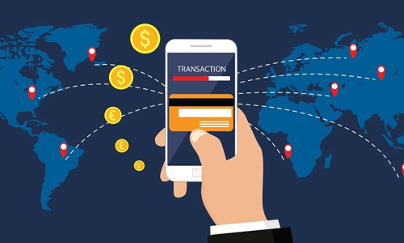
Bitcoin is increasingly becoming recognized as a digitally-verifiable scarce asset. Also, people are beginning to realize the potential of cryptocurrency for a wide range of use cases. Furthermore, the barrier for entry in crypto is lowered substantially with the introduction of crypto-friendly banks.
Cryptocurrency and blockchain technology provide cryptographically secured transactions. This is something that will help improve transparency in the banking sector. Also, crypto-friendly banks could bring more bright minds to the blockchain industry, encouraging innovation on a scale never seen before.
Many arms of the legacy financial system are finally beginning to embrace blockchain technology. In particular, decentralized finance(DeFi) is changing the face of finance before our eyes. The DeFi 101 and DeFi 201 courses at Ivan on Tech Academy are the perfect way to learn about the shifting landscape of finance. Here, you can gain an understanding of the pivotal role that blockchain is already playing in this field.
From a global perspective, how we approach money is rapidly evolving. Ivan on Tech Academy is at the forefront of blockchain education, bringing you the highest quality educational material available. Check out some of the courses available now! Your perfect career in crypto might be just around the corner!
Bitcoin And Banks Summary
Throughout 2020, we got an inclination that something big was coming with the proliferation of crypto debit cards. Now, various platforms are racing to offer point-of-sale solutions that make it easy to spend crypto anywhere!
On the other hand, the narrative that crypto could kill banks has evolved. The conversation now focuses on how banks and crypto firms can position themselves to jump through the necessary regulatory hoops to become recognized as legitimate hybrid financial institutions. When Bitcoin and banks come together in the public’s consciousness, the entire crypto industry could reach true mass adoption.
Rather than the competition for dominance, interoperability between blockchains and financial institutions is leading the conversation around Bitcoin and banks. As crypto continues to be used as a force for innovation, the world is finally waking up to the fact that crypto could end world poverty and provide a compelling solution to a fractured financial system.
Businesses in every sector are turning to blockchain to optimize their finances and day-to-day operations. From healthcare, to supply chain management, fashion, and music, businesses across the board are embracing blockchain. The Blockchain Business Masterclassand Fintech 101 courses at Ivan on Tech Academy are designed to show you exactly how to implement blockchain to improve your business strategies. Also, these courses are perfect if you want to be the go-to person for all things blockchain-related in the company you work for!
